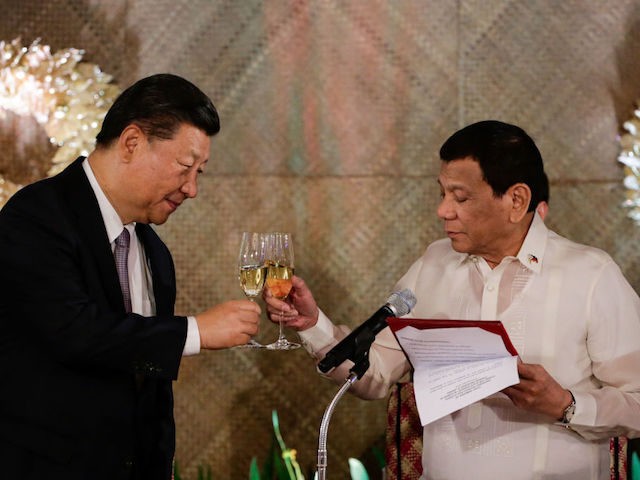Philippines President Rodrigo Duterte signed 29 deals with Chinese Communist Party leader Xi Jinping on Tuesday during the latter’s visit to Manila. The agreements grant China greater access to Philippine territorial waters and bind the Philippines to China’s expansive Belt and Road infrastructure project.
Xi has spent much of his tenure at the helm of the country invading the Philippines’ sovereign territory in the South China Sea, building artificial islands equipped with military assets on Philippine and Vietnamese territory. Duterte has repeatedly refused to challenge China, claiming that any attempt to assert Philippine sovereignty would end in a “massacre.”
A poll released this week shows Duterte’s approach to relations with China is widely unpopular in the Philippines. Hundreds of angry protesters greeted Xi in Manila when he landed on Tuesday, demanding China evacuate Philippine territory in the South China Sea.
Duterte has largely disregarded complaints from citizens regarding his China policy.
According to the Chinese state outlet Xinhua, Duterte used his meeting with Xi to emphasize that China should play a role alongside the Philippines to “jointly safeguard peace and stability of the South China Sea” and congratulate China for standing “on the right side of history in dealing with international affairs.”
“China and the Philippines agreed on Tuesday to upgrade their ties to comprehensive strategic cooperation and jointly advance the Belt and Road construction,” Xinhua explained. Xi reportedly emphasized the role that the Philippines should have in the Belt and Road Initiative (BRI), or One Belt, One Road (OBOR), China’s plan to control all the world’s major transportation infrastructure.
“The Chinese president said the Philippines is an important partner in jointly building the Belt and Road and urged both sides to deepen the synergy between the Belt and Road Initiative and the Philippines’ development plans, and boost cooperation in fields such as infrastructural construction, telecommunications and agriculture,” Xinhua reported.
“President” is the weakest of three titles Xi holds, the other two being the head of the Communist Party of China and head of the People’s Liberation Army (PLA).
Xi and Duterte signed a joint statement full of promises to cooperate on a variety of issues, including infrastructure development, energy, and fighting crime. The joint statement notes that the Philippines is now bound by “the Memorandum of Understanding (MOU) on Cooperation on the Belt and Road Initiative.” It also states that both sides promise “self-restraint” in the South China Sea.
The joint statement also highlights that China and the Philippines will work on allegedly cooperative oil and gas drilling operations in the South China Sea. China agrees in the exchange not to violate the Philippines’ sovereignty, and the two agree to work towards the China-led development of a “code of conduct” in the South China Sea to supersede international law.
“Both sides also reaffirm the importance of maintaining and promoting regional peace and stability, freedom of navigation in and over-flight above the South China Sea,” the statement reads. “Both sides stay committed to addressing disputes by peaceful means, without resorting to the threat or use of force, through friendly consultations and negotiations by sovereign states directly concerned, and in accordance with universally recognized principles of international law, including the Charter of the United Nations and the 1982 UNCLOS.”
China has stood in violation of the UNCLOS (United Nations Convention of the Law of the Sea) since its decision to begin constructing artificial islands in the Spratly and Paracel Island chain of the South China Sea in the first half of the decade. Prior to Duterte’s presidency, the Permanent Court of Arbitration at the Hague ruled that China’s constructions violated the UNCLOS and must cease immediately; China responded by vowing to ignore the ruling.
China also claims South China Sea territory belonging to Brunei, Taiwan, Malaysia, and Indonesia. As China does not acknowledge Taiwan’s sovereignty, it usurps any claims Taiwan makes as its own.
In remarks this week, Duterte presidential spokesman Salvador Panelo declared the ruling by the international tribunal “useless,” triggering outrage among opposition lawmakers who wish to see Duterte defend the nation’s sovereignty. Those lawmakers are not alone. According to a poll released this week by the Philippine firm Social Weather Systems (SWS), 84 percent of the country disapproves of the way Duterte is handling bilateral ties with China.
“This is a conscious effort on our part as Filipinos that we should instill in our memories that we won a legal battle in the international court in fighting for our sovereignty rights,” security analyst Chester Cabalza told the Philippine Star, suggesting that Duterte is failing to benefit from the “chilling effect” that having a ruling in his country’s favor should provide against Chinese construction.
China has not stopped its illegal development in the region. The Asia Maritime Transparency Initiative of Washington’s Center for Strategic and International Studies revealed satellite images on Wednesday showing a new Chinese military platform in the Paracel Islands, largely claimed by Vietnam.

COMMENTS
Please let us know if you're having issues with commenting.